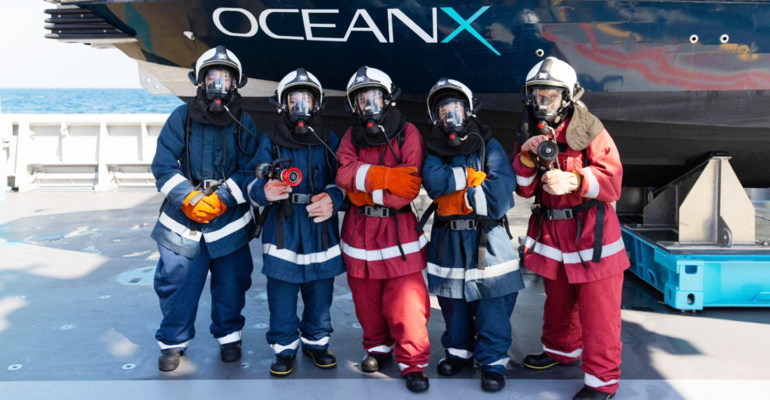IPB University Students Embark on Deep Sea Exploration of Indonesia with the World’s Most Advanced Vessel, OceanXplorer

Two students from IPB University’s Department of Marine Science and Technology (ITK), Faculty of Fisheries and Marine Sciences (FPIK), were granted a golden opportunity to join the sixth edition of the Young Explorers Program (YEP) held in Indonesia.
This program, initiated by OceanX, aims to provide students from around the world with insights, understanding, and direct experience in marine research and exploration aboard the world’s most advanced research vessel, the OceanXplorer.
The expedition began in Bali and concluded in Bitung, traversing various deep-sea areas of Indonesia, renowned for their rich biodiversity. Among the many participants who competed, I Gusti Aliyah Divana and Tsabita Najla Aulia succeeded in representing IPB University in this international program.
During the expedition aboard the ship, Divana and Tsabita gained extensive knowledge from experts in fields such as Acoustic Mapping, Principles of Oceanography, Environmental DNA, Ocean Justice, Ocean Careers, and Nutrients and Indonesian Biogeochemistry. They also participated in a livestream project and mentoring sessions, which allowed them to work directly with the crew across various divisions of the ship, including the Bridge, Submersibles, ROV, Media, Bosun, Mechanical Engineering, and Galley.
Their hands-on experiences included entering a submersible, piloting the ship, operating the ROV arm, recording entries in the Bridge logbook, donning firefighting gear and spraying water with a hose during fire drills, opening and closing valve pipes in the engine room, and extracting eDNA in the wet lab.
Both students also engaged in direct learning and discussions with the ship’s crew and the team of scientists onboard, utilizing case studies relevant to Indonesia.
This exploration program was a tremendous honor for Divana and Tsabita, who were selected as representatives of Indonesia’s top students in the fields of fisheries and marine sciences.
“For us, this experience was truly remarkable, as it not only broadened our horizons but also provided us with the opportunity to directly engage in activities we had never encountered during our studies. This experience has inspired us to delve deeper into marine sciences and to further enhance the exploration and conservation of Indonesia’s seas,” said Divana. (*/Rz) (IAAS/RUM)



